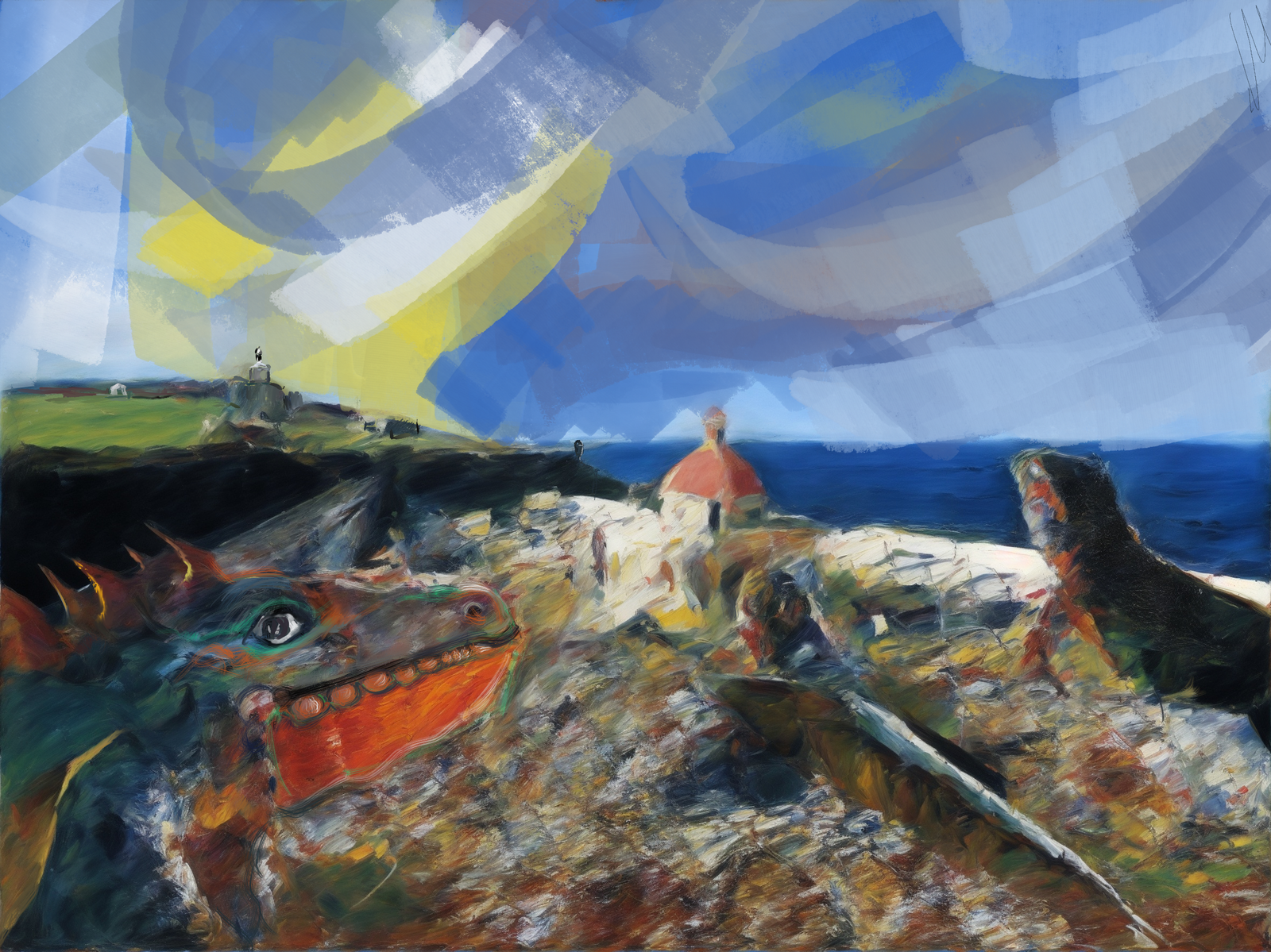[penci_button link=»#spanish» icon=»fa fa-address-book» icon_position=»left»]Versión en español [/penci_button]
Viejo San Juan, Puerto Rico
The iguanas slither from the branches of trees splintered by the hurricanes.
The iguanas crawl from the cracks in the ground split by the earthquakes.
The iguanas rise from brown floodwaters that carry bridges to their doom.
The iguanas multiply through the night of blackouts in hospitals and morgues.
The iguanas burrow beneath roads to bury their eggs in the lungs of cities.
The iguanas slap their clawed feet as they churn the earth of the farmer’s field.
Iguanas rip the rough skin of mango; iguanas rip banana; iguanas rip papaya.
The iguanas skitter through the cemetery by the sea, tails snapping when
they disappear between the crosses, sunning themselves on the walls,
hiding in the crevices of crypts where families still cling to each other
beneath the weathered stone. The iguanas stare stupefied at the bust
of a mustachioed poet who died after the bacteria feasted on his heart.
The iguanas know nothing of José de Diego, his songs of the guaraguao
and the pitirre, the hawk fleeing from the two-ounce kingbird, the slash
of claws to save her young still blind in the nest. The poet’s hawk is long
and dark with imperial wings, the poet’s kingbird an arrow through the neck.
An iguana warms his belly on the flat stone that says Pedro Albizu Campos.
The iguanas know nothing of Albizu: the lawyer and the canecutters’ strike,
the crowd listening in the rain, cane stalks in their heads igniting like torches.
The iguanas learn nothing from El Maestro, his staccato tongue on the radio
splitting the ground under the boots of the military governor, collapsing
the courthouses and flagpole of empire. The iguanas keep vigil at the tomb,
burial stone white as the stone of seditious conspiracy that buried him, stone face
of thirty years’ incarceration, subversive tongue gone to stone after the stroke.
The iguanas forget the thousands in black sweeping his coffin to the edge of the sea.
The green of the iguanas in the cemetery is the green of soldiers in uniform.
The green of the iguanas in the cemetery is the green of felt at the casinos.
The green of the iguanas in the cemetery is the green of cash on cruise ships.
The green of the iguanas in the cemetery is the green stacked in steel vaults.
The green of the iguanas in the cemetery is the green of lawn after lawn hidden
by gates, the green of mangoes in a bowl on the table of the absentee landlords.
In the movies on the drive-in screens and Saturday matinees of the Cold War,
iguanas played the dinosaurs, horns glued to their snouts, frills pasted to their
heads, thrashing in close-up struggle with other iguanas over The Lost World.
The dead eyes of the iguanas, keeping vigil over the city of the dead, will never
see the asteroid of their extinction, the earth melting to suck their bones into
whirlpools of mud, the wave sweeping them to sea, the flight of the poet’s kingbird.
this poem originally appeared in the Virginia Quarterly Review, Fall 2023.
Versión en español.
Las iguanas se deslizan por el camposanto costero
Traducido por Camilo Pérez-Bustillo, J.D
Viejo San Juan, Puerto Rico
Las iguanas se deslizan por las ramas de los árboles despedazados por los huracanes.
Las iguanas se arrastran por las grietas abiertas en el suelo por los terremotos.
Las iguanas se levantan desde las aguas crecidas enlodadas que cargan los puentes arrollados hacia su perdición.
Las iguanas se multiplican durante la noche del apagón en los hospitales y mortuorios.
Las iguanas cavan por debajo de los caminos para enterrar sus huevos entre los pulmones de las ciudades.
Las iguanas apalean sus garras al batir la tierra del conuco.
Las iguanas rasgan la piel áspera del mango; las iguanas rasgan plátanos y rasgan papayas.
Las iguanas se escabullen por el camposanto costero, dando coletazos al
desaparecer entre las cruces, se asolean por los muros,
escondidas entre los resquicios de las criptas donde las familias aún se abrazan
por debajo de las piedras pulidas. Las iguanas se quedan impávidas ante el busto
de un poeta bigotudo que murió con el corazón devorado por una bacteria.
Las iguanas no saben nada de José de Diego, ni de sus cantos del guaraguao
y el pitirre, ni sobre el halcón que huye del pájaro real de dos onzas, ante el filo
de sus garras que salvan a sus crías aún ciegas en el nido. El halcón del poeta es largo
y obscuro con alas imperiales, su pájaro real como una rígida flecha al cuello del monstruo.
Una iguana calienta su panza sobre la piedra plana que dice Pedro Albizu Campos.
Las iguanas no saben nada de Albizu: el abogado y la huelga de los cañeros,
la muchedumbre que lo escucha bajo la lluvia, los palos de caña en sus cabezas que se encienden como antorchas.
Las iguanas no aprenden nada del Maestro, su lengua entrecortada por la radio
que agrieta la tierra bajo las botas del gobernador militar, derrumbando
los tribunales y las astas banderas del imperio. Las iguanas hacen vigilia en la tumba
con su lápida blanca como la piedra de la conspiración sediciosa que lo sepultó,
el rostro de piedra de 30 años de pena, con su lengua sediciosa hecha piedra por la apoplejía.
Las iguanas olvidan los miles de enlutados portando su ataúd hasta el borde del mar.
El verde de las iguanas en el camposanto es el verde de los soldados uniformados.
El verde de las iguanas en el camposanto es el verde del fieltro en los casinos.
El verde de las iguanas en el camposanto es el verde del efectivo en los cruceros.
El verde de las iguanas en el camposanto es el verde amontonado en las bóvedas de hierro.
El verde de las iguanas es el verde de los céspedes ocultados, uno tras otro por los
portones, el verde de los mangos en el tazón de los terratenientes ausentes.
En los auto-cinemas y las matinées sabatinos durante la Guerra Fría,
las iguanas jugaban el papel de dinosaurios, con cuernos pegados a sus narices y
cabezas ornamentadas, entre combates de primera mano con otras iguanas por El Mundo Perdido.
Los ojos muertos de las iguanas, hacienda vigilia por la ciudad de los muertos, nunca verán
el asteroide de su extinción, la tierra que se derrite para chupar sus huesos entre remolinos
de lodo, la ola que los barre hacia el mar, el vuelo del pitirre.
Nota Biográfica

Credit: Lauren Marie Schmidt
[blockquote align=»none» author=»»] Martín Espada nació en Brooklyn, Nueva York, en 1957, de ascendencia puertorriqueña. Ha publicado más de veinte libros como poeta, editor, ensayista y traductor. Entre sus poemarios están: Floaters (2021), ganador del Premio Nacional del Libro, Vivas a los que han fracasado (2016), La república de la poesía (2006), Alabanza (2003), Imagina los ángeles de pan (1996) y Ciudad de tos y radiadores muertos (1993). Su obra ha sido reconocida con el Premio de Poesía Ruth Lilly de 2018, el Premio Conmemorativo Shelley de la Sociedad de Poesía de America, el Premio Literario del Centro Cultural Nacional Hispano, la beca de la Academia de Poetas Americanos, la beca Letras Boricuas y la beca Guggenheim. La república de la poesía fue finalista del Premio Pulitzer. Espada fungió como abogado de inquilinos en la comunidad latina de Boston antes de ser nombrado profesor de inglés en la Universidad de Massachusetts-Amherst.[/blockquote]
Traductor
Ilustración editorial por Gaddier
